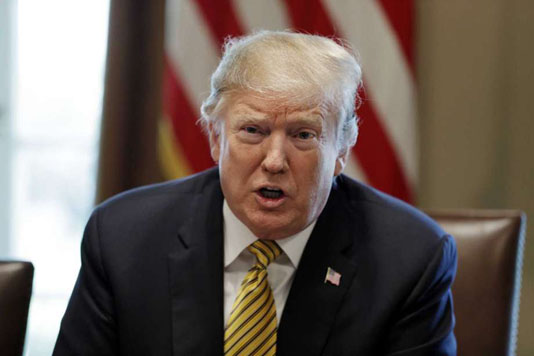WASHINGTON, April 5, 2019 (BSS/AFP) – President Donald Trump on Thursday
retreated from his threat to close the US-Mexican border, warning he will
instead impose car import tariffs if the major US trading partner does not do
more to stop undocumented migrants and drug smugglers.
“If Mexico doesn’t give the help, that’s OK, we’re going to tariff their
cars,” Trump said at the White House. “I will do it. I don’t play games.”
Trump said he was giving Mexico one year to get the cross-border drug trade
down or see him impose tariffs at 25 percent. If that does not work, closing
the border would come next, he said.
It was not immediately clear if Trump’s demand for Mexico to crack down on
the flow of migrants also faces a one year deadline or has to be satisfied in
the near future.
Trump said that Mexico had started to detain would-be migrants this week,
responding to his repeated recent threats to close the border.
Mexico is doing a “really great job” at “grabbing and taking” people, he
said.
But suggesting that he wants immediate results, he added that “maybe by the
end of this news conference or tomorrow that will stop, and if that stops, we
are doing a big tariff.”
Regardless, the tariffs option signaled a retreat from previous suggestions
that the border might be shut down, at least in parts, within days.
Trump says there is a national emergency from the influx of undocumented
migrants and drugs and that drastic action is needed.
A planned visit on Friday to the California border area had raised
expectations for a dramatic move. However, his border closure threat alarmed
politicians across the country, including in his own Republican Party, who
warned of dire economic fallout.
– Confusing policy unveiling –
This was the second apparent climbdown by Trump on a big issue in a week.
Earlier, he backed away from announcements that the Republicans were ready to
reform America’s notoriously expensive healthcare system, when party leaders
indicated they did not want to get sucked into what amounts to a political
minefield.
Trump’s new border policy was first announced in a confusing statement to
journalists at a White House meeting on the completely unconnected subject of
US urban renewal.
Speaking without notes, full of digressions and often failing to finish
sentences, Trump was not wholly clear on the details of his border policy
changes.
“If Mexico doesn’t do what they can do very easily, apprehend these people
coming in… we’re going to tax the cars, and if that doesn’t work, we’re
going to close the borders,” he said.
“We’re also going to do something having to do with tariffs on drugs
because… hundreds of thousands of lives (are) ruined a year in our
country,” he said. “If the drugs don’t stop we’re going to put tariffs.”
“So we will put tariffs if they don’t apprehend (migrants) and ultimately –
– we’re going to give a period of time, but if in a year from now, if drugs
continue to pour in, we’re going to put tariffs on them,” he said.
In Mexico City, Economy Minister Graciela Marquez Colin urged Trump not to
disrupt trade relations.
“For the Mexican government, it is very important to keep migration issues
and trade issues separate,” she told a press conference.
“The United States sometimes mixes the two issues. To us, it’s very
important to keep the ratification of the trade agreement on one track and
migration-related issues on another,” said Marquez, referring to the newly
negotiated USMCA or United States-Mexico-Canada deal.
“In terms of any new tariffs, we would have to discuss them in terms of a
relationship between two trade partners who are in the process of modernizing
a trade agreement,” she added, referring to NAFTA, the existing trade
agreement that the new USMCA deal seeks to update.
The leaders of the US, Mexico and Canada signed the successor deal to NAFTA
in November after more than a year of negotiations.



